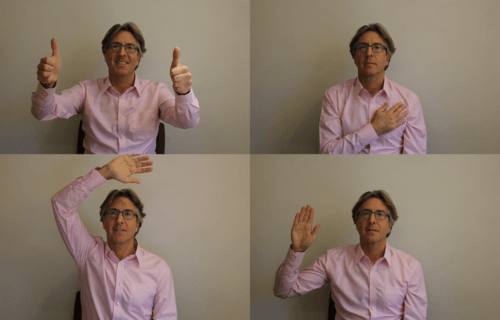EXETER, United Kingdom — Using simple gestures such as a thumbs up or placing your hand on your heart can make video conferencing more bearable, a new study suggests.
Video call platforms have exploded in popularity since the pandemic with so many people having to work from home. However, previous studies have found that constantly chatting with colleagues over a screen instead of in-person can lead to poor mental well-being, confused communication, and fatigue.
To help overcome the problems, researchers from University College London (UCL) and the University of Exeter have developed a technique called Video Meeting Signals (VMS) for use during virtual meetings. These gestures include a thumbs up, which shows agreement, and a hand on the heart, which express sympathy.
“Gestures are a very human way to communicate that predates the spoken word, yet have become far less used by people in video communication. Now, our study indicates how hand signals aid communication in a digital world, and have psychological benefits. This research underlines that there’s something about the use of gestures specifically appears to help online interactions and help people connect and engage with each other,” says Paul Hills of UCL in a media release.
“This can improve team performance, make meetings more inclusive and help with psychological wellbeing.”
The study, published in the journal PLOS One, tested their system with more than 100 undergraduate students. Only half learned to use the technique, while all students participated in two video-based seminars in groups of 10, before answering a survey about their experience.
Those who took VMS training beforehand reported a better personal experience and had better feelings about their seminar group. Analysis of the seminar transcripts suggested that students with VMS training were also more likely to use positive language.
The researchers found similar results in a follow-up experiment with non-students. In that study, participants learned to use emojis instead of VMS gestures, but this did not lead to the same improved experience. Now, the researchers want to continue studying VMS, investigating the detail of how it works and how to get the most out of it.
“Because you can’t make eye contact or pick up on subtle nods, gestures and murmurs of agreement or dissent in video conferences, it can be hard to know if people are engaged with what you’re saying,” says Professor Daniel Richardson from UCL.
“There have been attempts to use more technology to improve video conferencing, such as emojis and response buttons, but we found strong evidence that encouraging people to use more natural hand gestures had a much better effect on their experience.”
South West News Service writer Danny Halpin contributed to this report.

